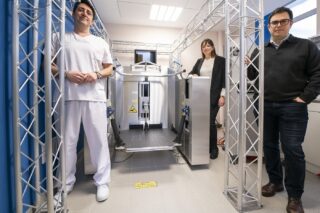Phagos, a Paris-based biotech company, is spearheading the development of customizable bacteriophage treatments as alternatives to antibiotics with initial applications in livestock, addressing the growing global concern of antimicrobial resistance (AMR).
As the world grapples with the escalating crisis of AMR, the urgency to find sustainable solutions to replace antibiotics has never been greater. Phagos is taking a pioneering approach by harnessing the potential of bacteriophages—viruses that specifically target and destroy bacteria. Discovered over a century ago, phages were eclipsed by antibiotics, which became the go-to solution due to their ease of production. However, the widespread use of antibiotics has led to the rise of resistant bacteria, a problem now threatening global health.
Phagos is leveraging cutting-edge technology to develop customizable phage-based treatments for various animal species. These treatments offer a dynamic solution, constantly evolving to keep pace with bacterial mutations.
“What we do differently is to fight ever-evolving diseases with ever-evolving medicines,” explains Alexandros Pantalis, CEO of Phagos, during an interview with MedicalExpo e-Magazine at biotech hub DocCity Suresnes LifeSciences where Phagos is based.
This adaptability is in sharp contrast to antibiotics, which lose effectiveness over time as bacteria develop resistance. Phagos’ phage-based solutions are designed to be dynamic, ensuring that they can be continuously updated. Pantalis emphasizes the importance of this:
“We see other bacteriophage strategies that bet on trying to create static one-size-fits-all bacteriophage solutions. In our opinion, this is reproducing the same mistakes as antibiotics—switching the problem from antibiotic resistance to phage resistance. By design, it can’t be a static solution; it needs to be a dynamic one.”
This ability to refine treatments over time, based on collected data and phage samples, sets Phagos apart.
The Making of Phagos: A Serendipitous Encounter
Phagos’s story begins with an unexpected encounter between two complementary minds. Pantalis, an economist turned entrepreneur, joined the Entrepreneur First program in 2021. The program matches CEOs with CTOs in hopes of sparking innovative partnerships. During downtime at the event, Pantalis stumbled upon a documentary about bacteriophages.
“I was watching this documentary, and I thought, ‘How is this not more widely known?’” he recalls.
He became fascinated with the potential of phages and casually brought up the idea during his second meeting with a potential collaborator, Adèle James. What happened next was a stroke of serendipity.
“I mentioned bacteriophages, and she just casually said, ‘I did my PhD on that topic,’” Pantalis shares, still amazed by the coincidence.
Adèle James, a microbiologist with a PhD in phage ecology, wasn’t initially planning to build a company around phages but found herself drawn into the idea as the pair discussed the potential applications. From there, the foundation for Phagos was laid, combining James’ deep scientific expertise with Pantalis’ entrepreneurial drive.
Their collaboration flourished as they explored various applications for phages, from combating bacterial contamination in paper factories to treating biofilms on ships. They eventually settled on focusing initially on animal health, recognizing it as the area where they could make the most significant and immediate impact.

The Promise of Phages in Animal Health
Phagos’s approach to phage therapy stands in stark contrast to the traditional use of antibiotics, which Pantalis describes as “static” and “indiscriminate” in their destruction of bacteria. Antibiotics typically target a broad range of bacteria, including beneficial strains. This leads to unintended consequences, such as creating a void in the microbiome that allows more dangerous bacteria to thrive.
“Antibiotics destroy the 99% of good bacteria to eliminate the 1% of harmful ones, causing side effects and waste,” explains Pantalis.
In contrast, phages are highly specific, targeting only the harmful bacteria without disturbing the beneficial bacteria. This precision minimizes side effects and helps maintain a healthy balance in the microbiome. Phages are also naturally eliminated from the animal’s system once their job is done, leaving no harmful residues—a significant advantage in an era when consumers are increasingly concerned about food safety and sustainability.
The Future of Phagos
Phagos’s progress has not gone unnoticed. In 2024, the company earned a spot on the prestigious FoodTech 500 list, joining the ranks of influential companies driving innovation in the food and agriculture sector. Pantalis acknowledges that this recognition has opened doors:
“This opens a whole network in the food sector,” he says. “There are many interesting phage applications in that sector, and they align well with our company strategy.”
Looking ahead, Phagos is focused on expanding its commercial applications. The company is currently testing its phage-based treatments in regions offering more favorable regulatory environments for innovation. However, the ultimate goal is to enter the U.S. market, where demand for sustainable livestock health solutions is growing. While Phagos is still in its early stages, Pantalis remains optimistic about the future.
“Every time we design a new bacteriophage solution, we get better,” he says.
Phagos’s ability to continuously improve its treatments, combined with advances in microbiology, artificial intelligence, and data science, puts the company in a strong position to lead the charge in transforming animal health—and potentially human health—through the power of bacteriophages.











